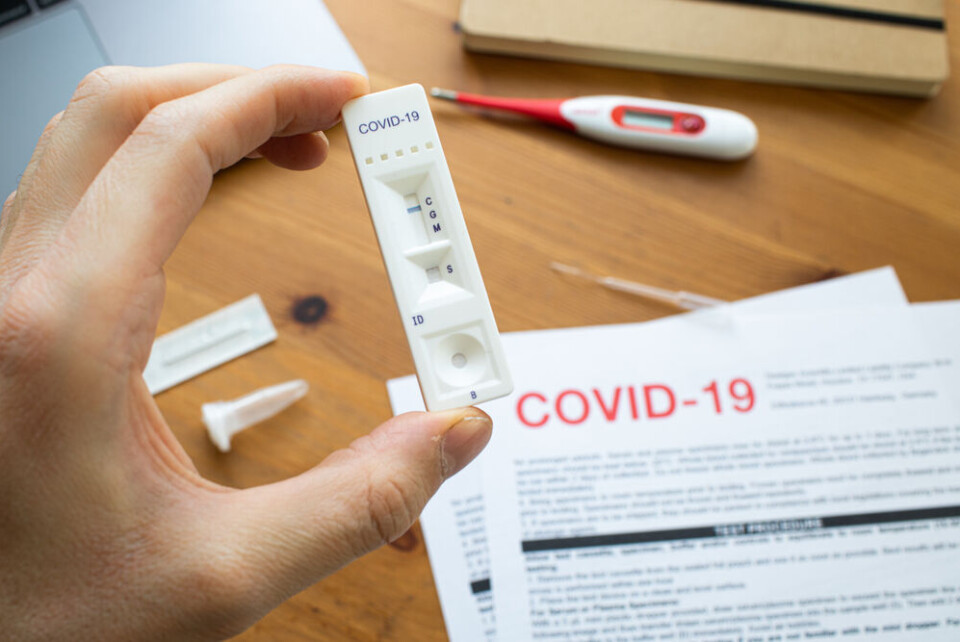-
Many Société Générale customers to be charged additional fees from April
There is some good news for international banking and instant transfers, however
-
Why gas prices in France are rising in April - and by how much
It comes after six consecutive monthly rises. Try these tips to reduce your bills
-
New notaire data suggests easing of Paris property crisis
Property experts have talked of ‘easing pressure’ and ‘breathing space’ after a four-year slump
France launches website to record results of at-home Covid tests
Use of the new site is voluntary but is intended to help stop the spread of the virus. Test result information will be held for three months and personal data anonymised

People in France who take at-home Covid tests are now requested to register the result online to enable the government to get a clearer picture of the results of these tests.
The monautotest.gouv.fr website launched yesterday (Monday June 21) and is set to enable users to indicate the results of their at-home tests.
(The website did not appear to be available at the time of writing, but it is expected to be back online soon.)
Until now, at-home test results have not been recorded anywhere, in contrast to antigen confirmation tests or PCR tests.
The aim is to ensure that people who have tested positive, and who could be potentially contagious, do not contaminate others.
The website was permitted by decree in the Journal officiel, which allowed for the creation of a ‘Portail Autotest Covid-19 (Covid-19 Self-test Portal)’. The site will contain personal information, personal consent, the conditions of the test taking, and the result.
The data will be anonymised and results will be kept for three months.
The website will ask you to create an account, if you have not already, on the CyberLab secure platform.
You then have to fill in the date, location, and context of the test; your surname, first name, date of birth, sex, and the result (positive, negative, or ‘undetermined’).
You also need to tick the box indicating that you “consent to your data being used for epidemiological or statistical reasons”.
The form does not require proof of your test result, so theoretically it could be possible for someone to enter false information. In contrast, recording a test result is voluntary, and there is no guarantee that everyone will fill in the form once they have taken an at-home test.
The aim of the site is to make sure people who test positive do not infect others, and can benefit from contact tracing for their recent contacts.
People who test positive at home are asked to take an antigen or PCR test to confirm the result, but there is no way of forcing them to do this, nor of following them to ensure they self-isolate.
Wider use of self-testing kits
The website comes after health authority la Haute Autorité de Santé recommended that some method be introduced to trace self-testing results.
On March 16, it said: “The traceability of self-tests is not guaranteed, thus impacting the evolution of the epidemic, isolation measures, and the search for contact cases.”
It recommended that, due to this potentially "damaging" situation, "appropriate procedures" should be put in place.
At-home testing kits are only to be used by people without Covid symptoms over the age of 15. They include a swab that is shorter than that used in PCR tests, a small plastic tube, a small bottle of reactive solution, and a plastic tray that shows the result.
Testers must insert the swab high into their nostril and twist five times, place the swab inside the plastic tube and mix it with several drops of the solution. Then, using the tube’s nozzle, place two drops of liquid inside the tray where indicated.
After several minutes, one line will show on the test to demonstrate whether it is working correctly, and then if the result is positive, a second line will appear soon after. Even an extremely faint second line indicates a positive result.
Health Minister Olivier Véran this week announced that 8 million at-home testing kits will be distributed across France over the next two months.
Speaking in the Journal du Dimanche, he said: “[These will be] distributed freely on beaches, in campsites, hotels, and sports halls.”
At-home testing kits are currently only available in pharmacies, and the government is seeking to encourage a wider take-up among the public.
Related stories
Covid France: Changing rules for testing and quarantine this summer
Self-testing Covid kits on sale in France: What you need to know
Explained: How to use home Covid tests on sale in France
























